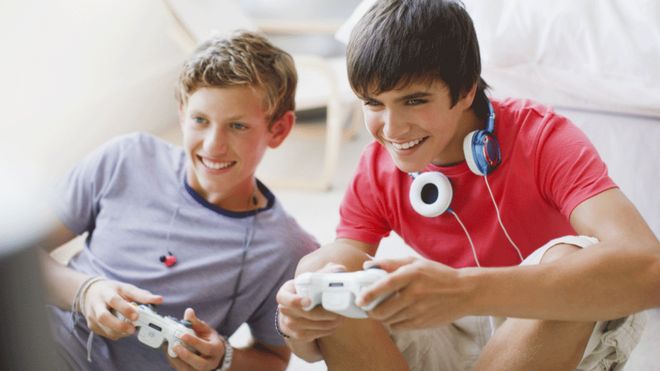- 2 January 2018
- 242comments
-
(건강) WHO는 공식적으로 게임중독을 "게임장애"로 분류아름다운 인생/건강 2018. 1. 5. 16:24
출처: http://www.bbc.com/news/technology-42541404
Gaming addiction classified as disorder by WHO
 GETTY IMAGES
GETTY IMAGESAccording to an Oxford University study, boys are more likely to spend time gaming than girls 옥스포드대학 연구에 의하면, 남아가 여아보다 게임에 더 열중하는 경향 Gaming addiction is to be listed as a mental health condition for the first time by the World Health Organisation. 게임중독이 세계보건기구에 의해 최초로 정신건강상태로 분류될 예정. (게임중독: gaming addiction)
Its 11th International Classification of Diseases (ICD) will include the condition "gaming disorder". (International Classification of Diseases: 국제질병분류) (게임장애: gaming disorder)
The draft document describes it as a pattern of persistent or recurrent gaming behaviour so severe that it takes "precedence over other life interests". **게임장애의 정의** 게임장애=다른 관심사들을 훨씬 앞지르고 꾸준히 그리고 반복적으로 게임을 하는 행위의 패턴. (recurrent: 되풀이되는, 반복되는, 재발되는) (take precedence over: ~보다 우선하다. 동사는 precede: 우선/선행하다)
Some countries had already identified it as a major public health issue.
Many, including the UK, have private addiction clinics to "treat" the condition.
The last version of the ICD was completed in 1992, with the new guide due to be published in 2018.
The guide contains codes for diseases, signs and symptoms and is used by doctors and researchers to track and diagnose disease. (track: 길, 발자국, 추적하다)
It will suggest that abnormal gaming behaviour should be in evidence over a period of at least 12 months "for a diagnosis to be assigned" but added that period might be shortened "if symptoms are severe".
Symptoms include:
- impaired control over gaming (frequency, intensity, duration) (impaired:손상된, 제 기능을 못하는,(신체적・정신적으로) …장애가 있는)
- increased priority given to gaming
- continuation or escalation of gaming despite negative consequences
Dr Richard Graham, lead technology addiction specialist at the Nightingale Hospital in London, welcomed the decision to recognise the condition.
"It is significant because it creates the opportunity for more specialised services. It puts it on the map as something to take seriously." (put sb/sth on the map: ~을 유명하게[중요하게] 만들다)
But he added that he would have sympathy for those who do not think the condition should be medicalised. (have sympathy for: 동정하다, 가엾게 여기다)
"It could lead to confused parents whose children are just enthusiastic gamers." 게임중독을 가볍게 여기는 사람의 사고
He said he sees about 50 new cases of digital addiction each year and his criteria is based on whether the activity is affecting basic things such as sleep, eating, socialising and education. 게임(디지털)중독을 판단하는 기준.
He said one question he asked himself was: "Is the addiction taking up neurological real-estate, dominating thinking and preoccupation?" (neurological real-estate: ??? 다른 모든 걸 압도하는 신경학적 자리) (preoccupation: ~ (with sth) (어떤 생각・걱정에) 사로잡힘, 집착; 뇌리를 사로잡고 있는 생각)
Many psychiatrists refer to the Diagnostic and Statistical Manual of Mental Disorders (DSM), the fifth edition of which was published in 2013. (DSM: the Diagnostic and Statistical Manual of Mental Disorders. 정신질환편람)
In that, internet gaming disorder is listed as a "condition for further study", meaning it is not officially recognised.
Lots of countries are grappling with the issue and in South Korea the government has introduced a law banning access for children under 16 from online games between midnight and 06:00. 한국의 경우, 16세 이하 아동은 자정부터 다음날 아침 6시까지 인터넷접속을 금지하는 법을 도입. (grapple with: to try to deal with)
In Japan, players are alerted if they spend more than a certain amount of time each month playing games and in China, internet giant Tencent has limited the hours that children can play its most popular games. 일본에서는 일정시간 이상 게임을 하면 게임하는 사람에게 경고를 보냄. 중국에서는 텐센트가 아동이 게임하는 시간을 제한
A recent study from the University of Oxford suggested that, although children spend a lot of time on their screens, they generally managed to intertwine their digital pastimes with daily life. 옥스포드대학의 최근 연구에 의하면, 아동들이 온라인 게임에 많은 시간을 투자하는 건 사실이나 다른 일상활동과 잘 곁들여 하고 있으니, 걱정할 건 없다.
The research - looking at children aged eight to 18 - found that boys spent longer playing video games than girls.
Researcher Killian Mullan said: "People think that children are addicted to technology and in front of these screens 24/7, to the exclusion of other activities - and we now know that is not the case."
"Our findings show that technology is being used with and in some cases perhaps to support other activities, like homework for instance, and not pushing them out," he added. (push sb/sth out: 몰아내다, 밀어내다, 대체하다)
"Just like we adults do, children spread their digital tech use throughout the day, while doing other things."
관련 한국뉴스기사: http://www.yonhapnews.co.kr/bulletin/2017/12/28/0200000000AKR20171228147000009.HTML
'아름다운 인생 > 건강' 카테고리의 다른 글
(건강) 질 좋은 대변 제공자를 찾습니다 (0) 2019.01.24 (건강/동영상) 뉴스타파: GMO를 먹지 않을 권리 (0) 2018.05.23 (건강) 인도에서 사용한 생리대를 수거하는 이유 (0) 2017.09.09 (건강) 치매를 줄이는 9가지 생활습관: 치매 中 3분의1 예방 가능 (0) 2017.07.25 (건강) 영국 10년 실내금연 정책 시행 후 달라진 점들 (0) 2017.07.01 - impaired control over gaming (frequency, intensity, duration) (impaired:손상된, 제 기능을 못하는,(신체적・정신적으로) …장애가 있는)